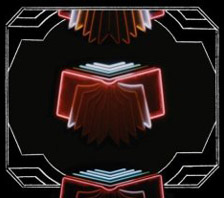
Arcade Fire’s second full-length is marked by maturity and downbeat lyrics: the results are mixed, but never less than engaging. Win Butler’s voice has developed: instead of the awkward yelp of ‘Funeral’, his vocals are deeper and more controlled – still quavering, but this time not with fear and confusion, but with outrage, anguish and pride. Think Springsteen: Win clearly has done. Behind him, the band’s all-in whistles-and-bells approach has been streamlined: horns and strings work with the rhythm section, rather than against it, creating a new urgency that makes their recent Clash covers seem all the more appropriate. The lyrics drive the point home: “you got your problems, and me I got mine”, declares Butler on ‘Ocean of Noise’, appropriating the stoic romanticism of many a Springsteen character. ‘Antichrist Television Blues’ leans heavily on this sort of imagery: “Into the light of a bridge that burns, As I drive from the city with the money that I earned ... Any idea where I was at your age? I was working downtown for the minimum wage.”
Arcade Fire aren’t the first indie band to latch onto the Clash and the Boss as handy reference points for combining maturity with passion and political dissent with popular appeal. It’s a little surprising to find a band whose debut possessed such a clear and original voice to draw such immediate and obvious comparisons, but for the Arcade Fire, this isn’t anything like a thoughtless short-cut or a straightforward appropriation. Springsteen imbues his characters with passions and dreams that provide temporary escape from worldly responsibilities (or, at least, lend those responsibilities a sort of dignity and nobility). Butler, on the other hand, draws authority from these honest-working-man tropes, in order to root his own lyrical themes (magic, wonder, faith, an unspecified “we” and “they”) in a new context: one of bitter experience, emotional, social and political. In place of ‘Funeral’’s evangelical call-to-arms, we now find Butler criticising one who is “working for the church while your family dies.” A world-weary Butler could be addressing a younger, more idealistic version of himself: “still a soldier in your mind, but nothing’s left on the line.”
The war on terror and the war in Iraq loom large, through repeated references to “soldiers” and “aeroplanes crashing”. Such lyrics invite critical scrutiny, and it is here that ‘Neon Bible’ is most engaging, but also most frustrating. Butler balances maturity with innocence. He is hesitant to generalize, uncertain of his authority, and aware of his own potential culpability (“I’m through being nice … am I the Antichrist?”). This is often a more satisfying response to political awakening than, say, Jack White’s retreat into childish simplicity or bloke-ish conviviality, or than Kele Okereke’s pompous spokesmanship for any self-righteous cause going. But such doubts can equally dominate, prompting a retreat into vague allusions: a girl, a lighthouse, a well, an island, a King, “a house on fire, a rising sea”, “a river so deep … a mountain so high”. ‘Funeral’ was full of these tropes, but they were redeemed by the album’s passion and purpose. ‘Neon Bible’ is occasionally seems divided between groundless escapism and relentless pessimism, neither of which are endearing. On the album’s least successful song, ‘Windowsill’, the ills of the modern world are listed, prefixed by “I don’t wanna”: Butler can see no way out, no equivalent to ‘Tunnels'’ cry of “Look out for love!” Musically, too, ‘Windowsill’ seems like Arcade Fire by numbers, violin figures failing to connect with a plodding riff.
‘Black Wave / Bad Vibrations’ is more successful, featuring the standard Arcade fare: a “black wave in the middle of the sea”, comradeship and danger (“we’ll make it if we run”), some French; but also highlighting poverty and consumption, presented through overstatement and righteous cadence that would make Broooce proud: “I'm eating in the ghetto on a hundred dollar plate”. The album finishes strongly, with a beefed-up revival of ‘No Cars Go’, rediscovering a sense of community, purpose and faith in the face of uncertainty (“Old folks, let’s go! Don’t know where …”). ‘My Body Is a Cage’ marches into the distance, its gloomy organ chords and stadium-sized drums recalling the darker moments of Frankie Goes To Hollywood (particularly their cover of ‘Born To Run’, as it happens), chanting “You're still next to me, my mind holds the key,
set my spirit free”. It’s a defiant assertion of faith and personal responsibility, in “an age whose name I don’t know.” Arcade Fire’s growing pains are compelling: few albums this year will receive as much scrutiny, and few will deserve it.
A-
More fun:
Buy 'Neon Bible'Arcade Fire - 'Five Years' (David Bowie cover)
Berkeley Place has a live show from 2005.




No comments:
Post a Comment